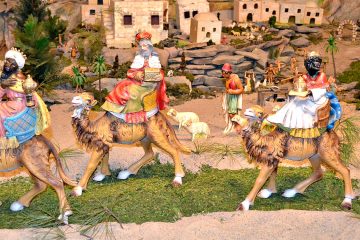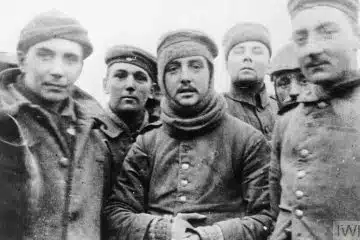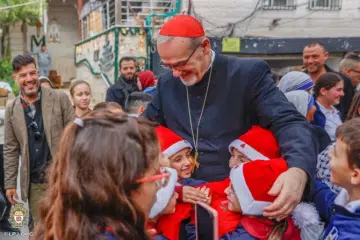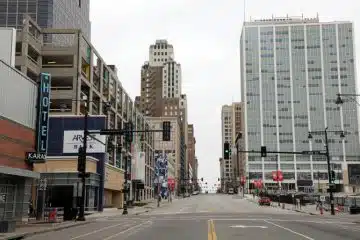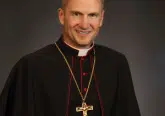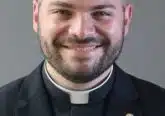Sudanese look to future after referendum passes
February 25, 2011
By Eileen Connelly, OSU
ARCHDIOCESE — The final results of a Jan. 9-15 referendum in southern Sudan were announced earlier this month, giving Sudanese residents of the Archdiocese of Cincinnati cause to celebrate. The vote was overwhelmingly in favor of southern Sudan splitting from the north, paving the way for the creation of a new independent state effective July 9.
 |
|
Comboni Father Ruffino Ezama shares the Sign of Peace with Mario Mou, a Sudanese living in Dayton, after a Mass at the Comboni Mission Center Feb. 4. (Courtesy photo) |
According to the Southern Sudan Referendum Commission, which organized the vote, 98.83 percent of voters voted for separation. The vote on independence was mandated by the 2005 Comprehensive Peace Agreement that ended decades of war between northern and southern Sudan.
Some 200 Sudanese reside in Ohio, many of them resettled locally through the Refugee Resettlement Programs of Catholic Charities Southwestern Ohio and Catholic Social Services of the Miami Valley. The communities in Ohio were required to travel to Washington, D.C., to cast their votes. The archdiocesan Catholic Social Action Office, Comboni Missionaries, Greater Cincinnati Advocates for Darfur, St. Leonard Faith Community and members of other area religious and community groups contributed to help them make the trip.
Concerned about the potential for violence regardless of the referendum’s outcome, the Catholic bishops of Sudan issued a statement last November calling for calm after the voting results were announced. Although 38 persons were killed as they crossed the border to vote in South Sudan, local Sudanese are relieved that the process was essentially a peaceful one.
“We want to thank the U.S., the international community and people of Sudan for creating a peaceful atmosphere during the voting process,” said Oliver Mogga, a native of Sudan and visiting professor at Miami University who has resided in the United States since 1997. “Our country finally has the opportunity to appreciate its destiny. There is a lot of euphoria among the people now, and many expectations.”
“This is what we’ve been waiting for,” added Mayik Koriom, who is originally from the city of Wau in southern Sudan and was resettled locally in 2003. “The people have spoken and are very excited. The bullets have been replaced by ballots.”
In the months leading up to the referendum, religious and community organizations in the archdiocese assumed an active role in educating local Catholics and others about the significance of referendum from a social justice perspective, along with advocating with federal officials, urging the Obama administration and Congress to ensure that responsible actors in Sudan comply with the peace agreement and the south Sudanese decision on self-determination.
Regarding the referendum results, Tony Stieritz, director of the Social Action Office, said, “This is really something we need to celebrate. We supported the self-determination of the south Sudanese people no matter what the results. The fact that it happened with so little violence is a blessing. It’s what so many people were hoping and praying for.”
John Carr, executive director of the department of justice, peace and human development at the United States Conference of Catholic Bishops, said the referendum “turned out better than anyone thought it would. The bishops have been very present to the church in Sudan and have expressed their solidarity.”
He noted that it is the policy of the U.S. bishops not to become involved in the internal conflicts of a given country without the request and wisdom of the local church.
“The church in Sudan asked for our help,” Carr explained. “They made it clear that outside pressure was essential for a just outcome in the referendum. The situation in Sudan was so aggressive and the regime in Khartoum so terrible, you just couldn’t turn away. The effort to establish a way forward in the south was a real sign of hope, and it didn’t hurt that these were members of our family of faith who were facing all kinds of obstacles because they share that faith with us.”
Carr praised efforts in the Archdiocese of Cincinnati to raise awareness of the issue and support the people of southern Sudan.
“Lots of people talk about solidarity, but the archdiocese really expressed it. There are places where practicing your faith really puts you at risk and we need to stand with the people in those places both locally and nationally. Cincinnati really led the way in this,” he said.
 |
|
Women from Southern Sudan embrace after the announcement of the official voting results in Khartoum Feb. 7. Election officials said that more than 98 percent of ballots in the January vote were in favor of independence, meaning Southern Sudan will become the world’s newest country in July. (CNS photo) |
Members of the local Sudanese community are well aware of the challenges that lie ahead for their country, as are the Comboni Missionaries, who have a long history of service in Sudan beginning with their founder, St. Daniel Comboni.
During a presentation in early February at the Comboni Mission Center, Father Ruffino Ezama shared some these challenges. One immediate concern is the flood of refugees from the north, eager to return to their newly independent homeland: “There is a serious need to invest in education and healthcare. These infrastructures don’t currently exist,” he said.
Linked to this, Father Ezama added, is the need for clean drinking water; the two countries will need to find a way to share water from the Nile River.
Also an issue are longstanding grievances among rival southern groups that could erupt into violence. “For so many years, the people of Sudan have been used to violence. This is the time for the physical force to stop and for the rival groups to begin respecting human rights and dignity,” he said.
Other issues to address before the country becomes independent are security, currency, national debt, citizenship and how to divide the majority of the oil reserves found in the south. The Abyei region, which straddles the border between north and south, remains a disputed area. Both the northern and southern economies rely heavily on the oil, with the reserves mainly in the south and the pipelines running north. Voting is still to take place to determine whether the region will become part of the north or south.
Mogga said continued international monitoring of the situation in southern Sudan, as well as help from faith-based organizations such as Catholic Relief Services, will be essential as the new country emerges.
“I feel the U.S. government should not just step back and say, ‘let them continue on their own.’ The U.S. can be very effective in ensuring the new leaders are held accountable by the people of Sudan,” he said.
“What we can do now is support the new nation through its birth,” added Stieritz. “Unsurprisingly, they will need a lot of international assistance and support to not fail and stand on their own two feet. I think that what the church will be advocating is support to build the country’s infrastructure and targeting their own networks so they can tell us what is needed. Ultimately, though, they will need to build their own economy and use the skills of their own people to build their nation.”
Stieritz said local Catholics are working with members of the Muslim and Jewish communities in the archdiocese to determine the best way to continue to “stand in solidarity” with the people of southern Sudan. Meetings with government leaders are planned, he said, and Greater Cincinnati Advocates for Darfur, which has extended its mission beyond that region, is examining ways to raise funds to support CRS efforts and perhaps work with another non-profit organization to help provided needed resources in southern Sudan.
Koriom, who will complete a doctorate in civil engineering at the University of Cincinnati late next year, hopes to then return home to put his skills and knowledge to use.
“I’ll return to help in whatever limited way I can,” he said. “It will be important for our people to step up and build our own country, I think we will build an exemplary nation, but it will take a while and we have to be realistic.”
Carr said the situation in Sudan “remains a high priority for the church in the U.S. It’s important that we stay close to our Sudanese brothers and sisters and follow their lead. They will have a good sense of what needs to be done. We are connected to them by our family of faith. This gives us a reason to be involved and stay involved with the Sudanese and defend their rights and dignity.”
On March 4 the Combonis will conclude a series of Masses for the Sudanese and their peaceful transition to an independent state. Following the Mass, Samuel Loki, who is Sudanese, will discuss the need for South Sudan to discuss a future that doesn’t depend on oil. Loki is a professor at the International Center for Water Resources Management at Central State University and holds a doctorate in agricultural economics with specialties in agricultural management and resource development.
The evening of prayer and discussion runs from 7-9 p.m. at the Comboni Mission Center, 1318 Nagel Rd. Call 513-474-4997 or visit www.combonimissionaries.org for more information.
Sister Eileen Connelly can be reached at: [email protected].



